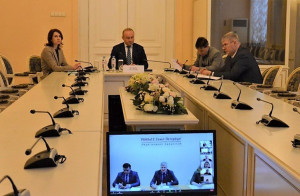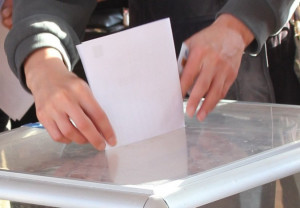IPA CIS Observers to Participate in Monitoring of Referendum of Kyrgyz Republic
23 March 2021

Chairperson of the IPA CIS Council, Speaker of the Federation Council of the Federal Assembly of the Russian Federation Valentina Matvienko received a letter on behalf of the Speaker of the Jogorku Kenesh of the Kyrgyz Republic Talant Mamytov inviting her to send a delegation for international monitoring of the preparation and holding of referendum.
An observer team is being formed from among the MPs of the IPA CIS Member Nations, as well as the staff members of IPA CIS Council Secretariat and the experts of the International Institute for Monitoring Democracy Development, Parliamentarianism and Suffrage Protection of Citizens of IPA CIS Member Nations (IIMDD IPA CIS). The observers will be accredited by the Central Commission for Elections and Referenda of the Kyrgyz Republic until 7 April 2021.
Amendments to the Constitution of the Kyrgyz Republic,
as proposed by the draft law submitted to the referendum on 11 April 2021:
1. President of the Kyrgyz Republic:
- Heads the executive branch (according to the current Constitution, the highest executive body is the Government);
- Is elected for a five-year term (currently – six-year term);
- May hold office for no more than two terms (currently – no more than one term);
- Receives the right to initiate legislation (currently doesn’t have such the right);
- Appoints, with the consent of the Jogorku Kenesh, and dismisses the members of the Cabinet of Ministers and the Prime Minister (currently the President only appoints the heads of the State Committee for National Security and the State Committee for Foreign Defense and Security, while the rest, including the Prime Minister, are appointed by the Jogorku Kenesh);
- Appoints and dismisses the heads of local administrations (currently this is a mandate of the Prime Minister);
- The maximum age limit of 70 years is canceled, the minimum age remains 35 years;
- The Presidential Administration and the Government are merged, the Prime Minister becomes the head of the Presidential Administration;
- Impeachment of the President becomes possible upon the initiative of 1/2 of the MPs of the Jogorku Kenesh and following the decision of 2/3 of the MPs (currently – upon the initiative of 1/3 of the MPs and following the decision of 1/2 of the MPs).
2. Jogorku Kenesh of the Kyrgyz Republic:
- Jogorku Kenesh is composed of 90 MPs (currently – 120 MPs);
- Electoral system will not be enshrined in the Constitution (currently the elections are held according to a proportional system);
- Limitation on the maximum number of mandates received by one party is lifted (currently – no more than 65 mandates for one party);
- Minimum age for MPs is increased from 21 to 25 years;
- Powers of an MP are terminated if he/she is absent from meetings for 10 working days for no proper reason (currently – for 30 working days);
- The possibility for an MP to retain his mandate and the right to vote when appointed as Prime Minister or Deputy Prime Minister is lifted.
3. Government of the Kyrgyz Republic:
- Cabinet of Ministers is composed of the chairperson, his/her deputies and other members of the Cabinet (currently – the Prime Minister, Deputy Prime Ministers, ministers and heads of state committees);
- President presides over the meetings of the Cabinet of Ministers (currently – the Prime Minister does);
- President directs the work of the executive branch (currently the Prime Minister is in charge of the Government);
- Structure of the Government is determined by the President (currently – by the Prime Minister);
- Chairperson, his/her deputies and other cabinet members are appointed by the President with the consent of the parliament (currently the Prime Minister is nominated by the majority faction in the Jogorku Kenesh, and the Jogorku Kenesh approves the structure and composition of the Government).
4. Judicial system:
- Constitutional Court will be established (currently the Constitutional Chamber operates within the Supreme Court);
- Chairperson and deputy chairpersons of the Constitutional Court and the Supreme Court, upon the proposal of the Council of Judges are appointed by the President for five years with the consent of the Jogorku Kenesh (currently the chairperson and his deputy chairpersons are elected by the court for three years);
- Supreme Court receives the right to initiate legislation on issues under its jurisdiction.
5. People’s Kurultai (new body):
- An advisory, supervisory, public-representative body is established, which provides recommendations on the directions of social development. Its structure and rules of procedure is determined by constitutional law.
6. Appointing the referendum on the amendments to the Constitution:
- Appointed by the President upon the initiative of at least 300,000 voters, or by the President, or by 2/3 of the MPs



